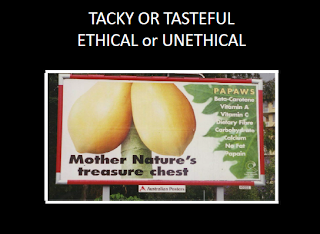This lecture was about ethics and what we find acceptable in journalism and advertising. Something may be unethical, or it may be tacky, but still ethical. Some people get confused about what is wrong and what is simply tacky.
We were pretty involved in the lecture because we had to fill in a piece of paper rating how tacky or tasteful and ethical or unethical we thought various images or videos were. Below I have given some of the examples.
I remember seeing the billboard "Cheap enough to say, Phuket I'll go." I don't have a problem with that one and neither did the public. (Digression: In terms of effectiveness, it only made me remember the slogan, not the brand, because until now I had been thinking it was a Virgin ad, not Air Asia. Probably because the colour scheme and cheeky humour is something I associate with Virgin.)
This ad was complained about because it was supposed to be selling shoes, but you wouldn't think that. They were called upon to pull it down but they declined.
This ad received no complaints:
We had a show of hands regarding the anti-smoking ad and overall we thought it was ethical, because of its message, but tacky.
The "Where the bloody hell are you?" ad was banned in the UK because of the word "bloody". I don't find "bloody" the least bit offensive.
This ad below was not complained about, although some did find it gruesome.
Some people complained about this ad stereotyping Australians.
There are different ethical theories, and we looked at deontology, consequentialism (aka teleology) and the idea of virtue. All ethics codes are deontological, because this means that you will do the right thing as long as you are following the rules. Consequentalism is all about the end result and with this, the end justifies the means. The "News of the World" phone-hacking scandal is an example of journalism practices using consequentialism. Virtue ethics is where goodness comes from having good habits of character and honourable virtues. These character habits are known as the "golden mean" of behaviour.
Professional journalism and communication use deontological codes. These include:
- MEAA (Media Entertainment and Arts) Code http://www.alliance.org.au/
- PRIA (Public Relations Institute of Australia) Code http://www.pria.com.au/
- AFA (Advertising Federation of Australia) Code
- AANA (Australian Association of National Advertisers) Code http://www.aana.com.au/
The AFA was particularly recommended to us. I would give a link to their website, but they don't seem to have an official one. However, overall, we were told that if we had to choose between a deontological code and virtue, it is best to be simply virtuous (and I certainly agree with that).
Here are some links regarding the "News of the World" phone-hacking scandal and journalism ethics:
http://www.bbc.co.uk/bbctrust/news/speeches/2011/ethics_journalism.shtml
http://ethics.journalism.wisc.edu/2011/07/11/news-of-the-world-and-the-poverty-of-journalism-ethics/
http://www.guardian.co.uk/media/greenslade/2012/mar/23/phone-hacking-leveson-inquiry
I liked how this lecture was very hands-on and it was interesting to see similarities or differences of opinion regarding ethics.





No comments:
Post a Comment